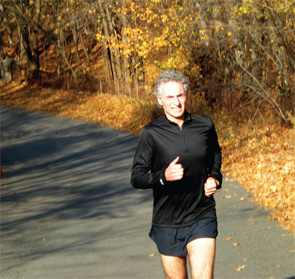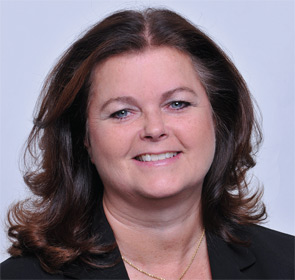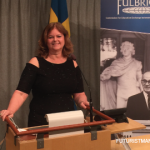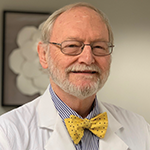The 2012 New Year brings a changing of the guard at The Rheumatologist (TR) as we welcome a new editorial team: Physician Editor Simon Helfgott, MD, and Associate Editors Richard Brasington, MD, and Maura Iversen, PT, MPH. All three rheumatology specialists bring a rich background of clinical, academic, and leadership expertise to TR.
For Dr. Helfgott, becoming physician editor of TR is an opportunity to “use the magazine as a vehicle to extend teaching to the whole rheumatology community.” Citing the diversity of the rheumatology specialty, he says TR is a great complementary companion to the ACR journals and gives the often-busy community of rheumatologists the opportunity to review topics in a “fast graphic fashion.”
“We’re looking to publish succinct reviews and to provide a forum where people can learn and contribute at the same time in their preferred manner,” he says. “You can pull out your iPhone or iPad or even your print version and learn.”

Dr. Helfgott’s own training began in his hometown of Montreal at McGill University, followed by fellowship training at Brigham and Women’s Hospital in Boston. While he spent several years working in the Brigham research labs, Dr. Helfgott says his true passion is “on the clinical side, caring for patients and teaching rheumatology to trainees.” He has spent his entire career at Brigham and Women’s, where he serves as the director of education and of the fellowship training program. When he’s not working, Dr. Helfgott is an avid runner. He also loves to cook, “but not using recipes. It’s more fun this way!”

Dr. Brasington, who thinks of himself as a “teacher who happens to be a doctor,” has similar goals for TR. Professor and head of the fellowship program at Washington University (WashU) in St. Louis, his goal is to see the articles in TR used as tools for education. “I would like to make the best evidence-based medicine accessible to the average reader in the [rheumatology] community who may not have the time that we academics do.”
Dr. Brasington, who has been on the faculty at WashU for more than 15 years, attended Harvard University in Boston for his undergraduate studies, followed by medical school at Duke University in Durham, N.C. He completed his internal medicine residency and rheumatology fellowship training at the University of Iowa in Iowa City. Prior to his move to St. Louis, Dr. Brasington spent 10 years in practice at the Marshfield Clinic in Marshfield, Wis., and through this experience learned just how difficult it is for practicing rheumatologists to find time to review the literature. “The missions of academic rheumatology and medicine in general are to try to help in the continuing education of people in practice,” he says. “TR is very straightforward … you can read the articles and get the message pretty quickly.”
In addition to educating readers on evidence-based medicine, Dr. Brasington also hopes TR will focus on disease states that aren’t as common: “There are so many things in rheumatology that are very important but not very well covered,” he says. “I’d like to address some of these conditions, such as skin problems in vasculitis and lung disease in rheumatoid arthritis, which are still important to know.”
Outside of academia, Dr. Brasington is a husband and father of four who spends his free time fishing. “I like fishing most of all because it’s a great way to be in touch with nature,” he says, having recently caught (and released) the “fish of a lifetime,” a 28-pound muskellunge.

Dr. Iversen, currently professor and chair of physical therapy at Northeastern University and a behavioral scientist and senior researcher in the Section of Clinical Sciences, Brigham and Women’s, Harvard Medical School, rounds out the group with a focus in both academia and research. Dr. Iversen has a doctoral degree in physical therapy and a doctoral degree and masters in public health. She received her second doctorate from the Harvard School of Public Health and her postdoctoral training at Harvard Medical School.
For her, TR is great resource for transitional researchers. “I love the idea of keeping clinical connections and encouraging clinicians to be involved with the organization, but also keeping us researchers in tune with what’s going on in the clinic,” she says. “[TR] is a great opportunity to have a publication that is a little more focused on clinical practice.” She would also like to see TR continue to place a strong focus on advocacy. As a past president of the ARHP, Dr. Iversen has spent significant time advocating for patients both locally and on Capitol Hill. “I have enjoyed my role in advocacy with the organization … this is one area where we could garner some greater interest,” she says. “Having some interesting clinical discussions and highlighting efforts of advocacy might encourage people to become involved in a way they haven’t thought of before.”
With a shared passion for teaching and education, the new editors’ diverse backgrounds promise a bright view for the future of TR. “Dr. Pisetsky and the rest of the staff have done a marvelous job, and the shoes to fill are gigantic,” Dr. Helfgott says, “but I hope we can enhance, and make [TR] even bigger and better.”
Alexandra Schultz is a writer based in Hoboken, N.J.
We Want to Hear from You!
All three members of the TR editorial team say that e-mail is their preferred communication method. They encourage readers to send ideas and feedback to:
Dr. Simon Helfgott: [email protected]
Dr. Richard Brasington: [email protected]
Dr. Maura Iversen: [email protected]


